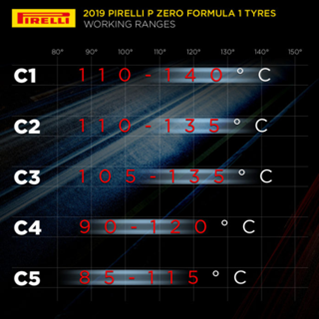Electrical components from envelope-pushing Formula 1 race cars often eventually make their way into consumer vehicles. In our previous article on critical electric components of F1 cars, we looked at lighting, fuel flow, batteries and motors. Temperature sensors and CPUs are two more specialized parts that have helped shape the modern Formula 1 race car.
F1 Tire Temperature Sensors
Formula 1 tires utilize a tremendous amount of energy as they navigate a racetrack. Given internal and external friction, tires get subjected to high thermal loads, which, when used properly, can increase their traction. As is true with all Formula 1 technology, F1 tire construction is meticulously designed and optimized to provide the maximum amount of traction in specific temperature ranges. The below image shows the varying optimal temperature ranges of the five different tires available in the 2019 racing season. It's evident that the functional operation window of an F1 racing tire is, in most cases, limited to a mere 30°C range.

Image Credit: Pirelli Motorsports
Somewhat intuitively, not all tires require the same temperature depending on their location on the vehicle. It's worth noting that there are strategic subsystems in F1 cars designed purely to manage tire temperatures, such as aerodynamic features aimed at cooling the typically warmer rear tires, and heating mechanism for the front tires. Naturally, it's imperative to have live temperature monitoring in place to gauge tire temperature and thus know which tires should be used. While the use of thermocouples or other methods of temperature sensing may seem novel, failure to accurately understand and control the temperature of racing tires can have a detrimental impact on the performance and safety of the car.
Central Processing Units in Formula 1 Racing
CPUs play a critical role in Formula 1 racing (compared to GPUs, VPUs, TPUs, and other processing units) as they are the only type of processing unit allowed by the FIA. However, their importance is twofold.
First, onboard processing is critical to monitoring and controlling the electronics within a race car. These onboard CPUs are beyond proprietary, but given the FIA limitations, it's undeniable that CPUs play a considerable role in the physical makeup of the F1 race car. In addition, this means that all design, manufacturing, modeling and data processing outside of the vehicle must be limited to CPUs. This regulation stems from a standardization of the capabilities of computer clusters utilized for computational fluid dynamics (CFD) and finite element analysis (FEA) modeling to ensure that each team has a relatively competitive chance at simulating the aerodynamic performance of new parts. Regardless, the importance of powerful CPUs is profound both on and off the track.
To learn more about other critical components in F1 racing, be sure to check out our previous article that covers the importance of fuel flow sensors, batteries, and lighting.


